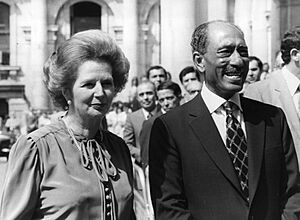Egypt–United Kingdom relations facts for kids
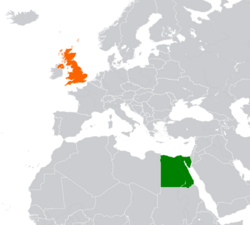 |
|
Egypt |
United Kingdom |
|---|---|
Egypt–United Kingdom relations are the friendly connections between Egypt and the United Kingdom. These ties have been strong for a long time. They include politics, defense, trade, and education. A very important topic in their relationship has always been the Suez Canal.
Contents
History of Egypt and the UK
British Rule in Egypt
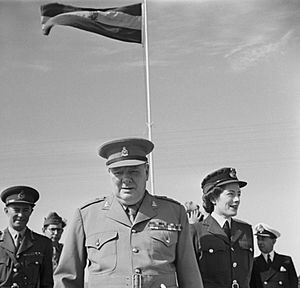
From 1882 to 1914, Britain had a lot of control over Egypt. Even though Egypt was still officially part of the Ottoman Empire, Britain made most of the important decisions. This was like a "hidden protectorate." In November 1914, the Ottoman Empire joined World War I against Britain. Because of this, Britain officially declared Egypt a protectorate. This meant Egypt was now under British protection and no longer connected to the Ottomans. The ruler of Egypt, called the Khedive, was replaced. The new ruler, Hussein Kamel, became the Sultan of Egypt in December 1914.
How Britain Took Control in 1882
Both Britain and France had a big interest in Egypt because they co-owned the Suez Canal. This canal was super important for trade. More than two-thirds of the ships passing through it were British. It was also the main route to India and the Far East.
In 1881, a nationalist uprising began in Egypt. It was led by Ahmed ʻUrabi against the Egyptian ruler, Tewfik. Tewfik worked closely with the British and French. Egypt's money situation was also a mess. Britain felt it had to act to protect the Suez Canal and its reputation. France did not join in.
On July 11, 1882, the British Prime Minister, William Ewart Gladstone, ordered the bombardment of Alexandria. This started a short war called the 1882 Anglo-Egyptian War. Britain quickly won. Even though Egypt was still officially part of the Ottoman Empire, British officials made all the decisions. The most powerful British official was Evelyn Baring, 1st Earl of Cromer. He had experience in India and used similar methods to control Egypt's economy. Britain promised many times to leave in a few years. But in reality, Britain controlled Egypt for about 40 years.
Historians say that Britain taking control of Egypt was a very important event. It changed the balance of power in the world. It gave Britain a secure route to India. It also made Britain very powerful in the Eastern Mediterranean and the Middle East.
Historians have debated why Gladstone, who was usually against imperialism, decided to invade. Some say it was to protect the Suez Canal from chaos and a revolt that threatened European interests. Others argue it was to protect the money British investors had put into Egypt. Some also suggest it was to boost the Liberal Party's popularity in Britain. Another idea is that Britain wanted to show its power and keep "civilized" order against the revolt.
Egypt Becomes Independent
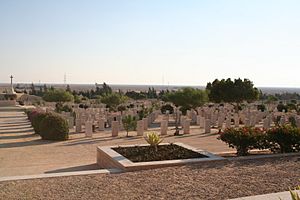
In December 1921, British authorities in Egypt sent a nationalist leader named Zaghlul away from the country. This caused more protests and violence. To calm things down and because Egyptian nationalism was growing, Britain declared Egypt independent on February 28, 1922. This ended the protectorate and created the Kingdom of Egypt.
However, Egypt was only partly independent at first. Britain still controlled Egypt's foreign relations, communications, military, and the Anglo-Egyptian Sudan. After 1936, Britain reduced its military presence and political advisors.
During World War II, British troops used Egypt as a major base for their operations in the region. Egypt was officially neutral in the war.
British troops moved to the Suez Canal area in 1947. But after the war, anti-British feelings grew stronger. The Egyptian Revolution of 1952 ended the Egyptian monarchy. It also removed the British military presence from Egypt. This led to the creation of the modern Republic of Egypt.
The Suez Crisis of 1956
In 1956, the Egyptian president, Gamal Abdel Nasser, took control of the Suez Canal. This canal was very important because most of Europe's oil came through it from the Middle East. Britain and France, working with Israel, invaded Egypt to take back the canal and remove Nasser from power.
However, the United States, led by President Dwight D. Eisenhower, strongly disagreed. The US used its diplomatic and financial power to force Britain, France, and Israel to leave Egypt. The British Prime Minister, Anthony Eden, was embarrassed and soon resigned.
This crisis had big consequences. The Suez Canal was blocked, and oil supplies were stopped. Nasser became an even stronger leader for Arab nationalism. The crisis also opened the door for Russia to become more involved in the Middle East.
Modern Relations Between Egypt and the UK
Today, Egypt and the UK continue to have relations in many areas. This includes military cooperation, like training and visits. They also work together on things like flights and allowing warships to pass through the Suez Canal. The UK also helps maintain the Commonwealth War Graves cemeteries in places like Heliopolis and El Alamein, where soldiers from past wars are buried.
Many people born in Egypt live in the UK. In 2001, about 24,700 Egyptian-born people were in the UK. By 2009, this number grew to about 27,000.
Economic Relations
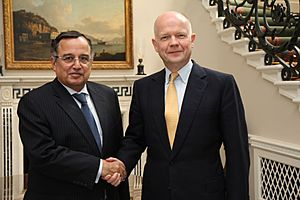
Trade between Egypt and the UK has grown a lot. In late 2014, a report showed that British exports to Egypt increased by 15%. Egyptian exports to the UK grew even more, by over 30%. The UK is the biggest investor in Egypt's economy. It accounts for 41.3% of all foreign money invested there. Projects like the New Suez Canal and Egypt's economic recovery after the 2011 uprising have helped this growth.
From 2004 to 2020, trade between Egypt and the UK followed an agreement with the European Union, because the UK was a member. After the UK left the European Union (called Brexit), the UK and Egypt signed a new trade agreement on December 5, 2020. This agreement started on January 1, 2021. In 2022, the total value of trade between Egypt and the UK was about £4.896 billion.
Diplomatic Missions
Egypt has its embassy in the United Kingdom at 26 South Audley Street, London.
The United Kingdom has its embassy in Egypt at 7 Ahmed Ragheb Street, Garden City, Cairo. Outside Cairo, there is a British Consulate-General in Alexandria. There is also an Honorary Consulate in Sharm el Sheik.
The current Egyptian Ambassador to the UK is Sherif Kamel. The British Ambassador to Egypt is Gareth Bayley.
Resident Diplomatic Missions
- Egypt has an embassy in London.
- The United Kingdom has an embassy in Cairo and a consulate-general in Alexandria.


